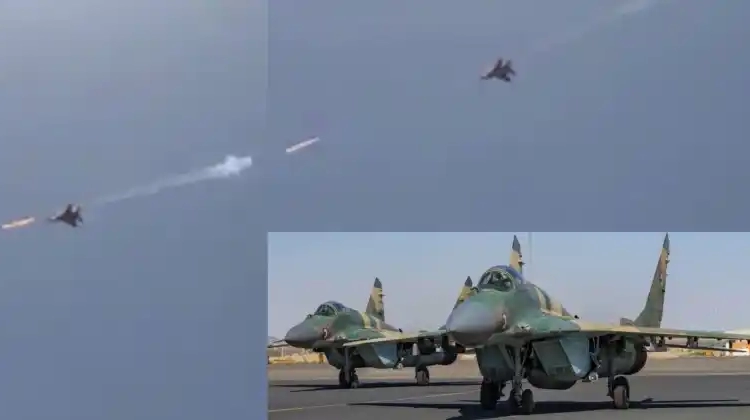In a dramatic turn of events, Sudan’s Rapid Support Forces (RSF) shot down a Russian-made MiG-29 fighter jet over Khartoum, the capital city on Tuesday.
This incident marks a significant escalation in the ongoing conflict, as it highlights the military capabilities of the RSF and the increasing international involvement in Sudan’s internal affairs.
With both sides making minimal gains, the situation in Sudan appears to have reached a stalemate, with the RSF currently controlling more than 80% of the capital.
About a month ago, the Sudanese Air Force deployed its MiG-29 fighter jets in support of the Sudanese Army’s ongoing military operations against the ‘Rapid Support Forces’ (RSF) militia in several parts of the country.
On April 15, videos of Sudan’s MiG-29 Fulcrum fourth generation fighter aircraft operating over the Sudanese capital Khartoum and firing air to surface projectiles, as part of a much larger air campaign by the Sudanese Military aimed at countering the Rapid Support Forces (RSF) militia group
The deployment of the MiG-29 fighter jets marks a significant escalation in the conflict and highlights the Sudanese military’s determination to take strong action against the RSF militia.
The Downed MiG-29 and the RSF’s Military Capabilities:
The shooting down of a Russian-made MiG-29 fighter jet showcases the growing military prowess of Sudan’s Rapid Support Forces. The RSF, initially established as a paramilitary group, has transformed into a formidable fighting force, equipped with advanced weaponry and trained personnel.
The downing of the MiG-29 demonstrates the RSF’s ability to confront sophisticated aerial threats, a development that may influence the dynamics of the conflict.
The MiG-29 is a modern and highly capable fighter jet, equipped with advanced avionics, weapons, and sensors. Its deployment in the conflict zone is a clear indication of the Sudanese Air Force’s commitment to providing air support to ground forces in the fight against the RSF.
Sudan acquired the MiG-29s from 2003-2004, and is one of five African countries to operate the MiG-29, with neighbouring Eritrea, Egypt and Libya as well as nearby Algeria.
Around last month also, several aircraft types were captured and destroyed in the ground by the RSF when they overran some military bases operated by the Sudanese military in Kobar Bridge in Khartoum.
The RSF also captured Egyptian military personnel from the El-Sa’ka special force’s group, as well as MiG-29M/M2s of the Egyptian Air Force (EAF).
The EAF MiG-29s and military personnel took part in a recent joint Egyptian-Sudanese military exercise Nile Eagles-2 held in Merowe Air Base in Sudan in March this year.
However, all captured Egyptian personnel and assets have since been returned to Cairo.
Also, Two Mi-24 Hind attack helicopters were captured on the ground. However, those appears not be airworthy.
A Stalemate in the Sudanese Conflict:
The ongoing conflict in Sudan has resulted in a deadlock, with both sides making limited progress. While the RSF controls a significant portion of the capital, it has been unable to secure complete dominance.
The opposing factions, which include various rebel groups, continue to mount resistance, resulting in a prolonged stalemate. The conflict has inflicted significant humanitarian suffering on the Sudanese population, with displacement, violence, and economic instability being widespread.
The RSF is a powerful and well-equipped paramilitary force that has been accused of numerous human rights violations, including extrajudicial killings, torture, and rape. The group has been involved in conflicts in Darfur, South Kordofan, and Blue Nile states, and has been accused of committing atrocities against civilians in these areas.
International Involvement and Implications
The downing of a Russian-made MiG-29 fighter jet in Khartoum raises concerns about the increasing international involvement in Sudan’s internal affairs.
The presence of foreign military equipment and personnel indicates a complex web of interests in the region. Such involvement has the potential to further complicate the resolution of the conflict, as external actors may pursue their own agendas.
Amid the ongoing conflict, the humanitarian situation in Sudan has reached alarming levels. Displacement, food insecurity, and inadequate access to healthcare and education pose significant challenges for the Sudanese people.
It is imperative for the conflicting parties to prioritize the well-being of the population and allow humanitarian organizations to deliver aid to those in need. International assistance and funding must be provided to address the humanitarian crisis effectively.
The shooting down of a Russian-made MiG-29 fighter jet by Sudan’s RSF underscores the evolving dynamics of the conflict in Sudan. With both sides making minimal gains and the RSF controlling a substantial part of the capital, the conflict appears to have reached a stalemate. International involvement further complicates the situation, necessitating a concerted effort by all stakeholders to pursue peaceful negotiations.





